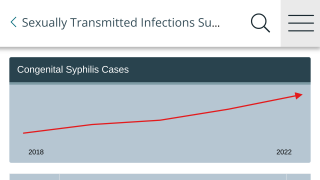128% Increase in Women Syphilis Cases

The Houston Health Department recently reported a syphilis outbreak has significantly impacted women in eastern Texas and continues to expand in 2023.
As of July 13, 2023, there has been a 128% increase in syphilis cases among women and a nine-fold rise in congenital syphilis in Harris County.
In response to the syphilis outbreak, Houston's Health department is waving all clinical fees for sexually transmitted infections at its health centers. Untreated syphilis during pregnancy can result in a stillbirth or a baby's death soon after birth.
Syphilis testing is recommended in Texas at a woman's first prenatal visit, during the third trimester, and at delivery.
"It is crucial for pregnant women to seek prenatal care and syphilis testing to protect themselves from an infection that could result in the deaths of their babies," said Marlene McNeese Ward, deputy assistant director in the department's Bureau of HIV/STI and Viral Hepatitis Prevention, in a related press release.
"A pregnant woman needs to get tested for syphilis three times during pregnancy."
Statistics from the department indicate new syphilis infections rose from 1,845 in 2019 to 2,905 in 2022, a 57% increase.
Cases among women totaled 674 cases in 2022, up from 295 cases in 2019.
And congenital syphilis soared from 16 cases in 2016 to 151 cases in 2021.
Since reaching a historic low in 2001, the rate of syphilis has increased almost every year in the U.S., increasing 28.6% from 2020 to 2021.
Nationwide, men account for the most cases of syphilis.
In most cases, syphilis goes undetected because the signs and symptoms are misinterpreted or unnoticed.
If untreated, Treponema Pallidum, the bacterium that causes syphilis, remains in the body and begins to damage the internal organs, including the brain, nerves, eyes, heart, blood vessels, liver, bones, and joints, says the U.S. CDC.
As of July 15, 2023, the U.S. FDA has not approved a syphilis vaccine.
Our Trust Standards: Medical Advisory Committee





